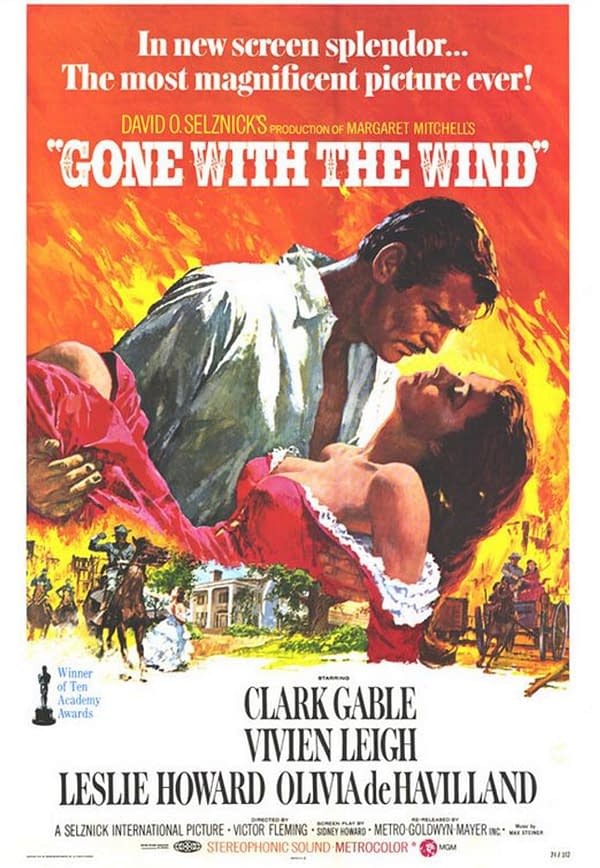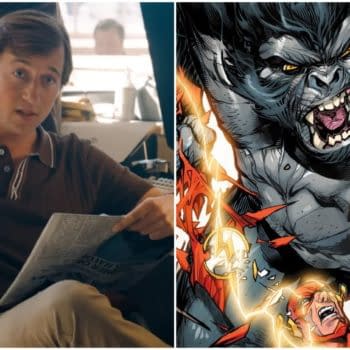Posted in: Movies | Tagged: 12 years a slave, american film institute, clark gable, gone with the wind, hbo max, john ridley, Los Angeles Times, margaret mitchell, mgm, national film archive, streaming, vivien leigh
Gone With the Wind is Gone from HBO Max For Now
Streaming service HBO Max has removed the Hollywood classic Gone With the Wind. The 1939 Hollywood classic, which won 12 Oscars, adapted Margaret Mitchell's 1936 romantic novel about life on an Atlanta slave plantation after the end of the Civil War. It has long been considered problematic in the last forty years when society became more progressive.

The removal of the movie is temporary: "'Gone With The Wind' is a product of its time and depicts some of the ethnic and racial prejudices that have, unfortunately, been commonplace in American society. These racist depictions were wrong then and are wrong today, and we felt that to keep this title up without an explanation and a denouncement of those depictions would be irresponsible," an HBO Max spokesperson told Variety. "These depictions are certainly counter to WarnerMedia's values, so when we return the film to HBO Max, it will return with a discussion of its historical context and a denouncement of those very depictions, but will be presented as it was originally created, because to do otherwise would be the same as claiming these prejudices never existed. If we are to create a more just, equitable and inclusive future, we must first acknowledge and understand our history."
Anatomy of a Classic Movie That is Horrible
When its box office earnings are adjusted for inflation, Gone With The Wind is considered the highest-grossing movie in Hollywood history. It is on the American Film Institute's list of Top 100 Movies. The Library of Congress selected it for preservation in the National Film Registry. It is rightly considered a social document of the attitudes of its era.
That doesn't make it any less horrible. Apart from its awful celebration of Southern plantation gentry life and its racist caricatures of its dark-skinned characters, it also has some appalling gender politics that would be considered monstrous in the #MeToo era. Scarlett O'Hara (Vivien Leigh) is portrayed as a headstrong romantic heroine – who owned slaves – and is "tamed" by Rhett Butler through rape. And she falls in love with him. In the end, he leaves her after she begs him to stay, and she vows to get him back. After he rapes her, this trope was actually commonplace in many women's romance novels for decades until recently. Rhett Butler's line "Frankly, my dear, I don't give a damn" when he leaves her became a classic and oft-quoted line, a celebration of masculine nonchalance. Many considered Clark Gable's portrayal of Rhett Butler to be a cool representation of American manhood at the time.
The Editorial That Took Down a Movie
This move came after an editorial in the Los Angeles Times by screenwriter John Ridley, who has written superhero comics for DC Comics and won an Oscar for the script of 12 Years A Slave, called for the temporary removal of the movie for the sake of these sensitive times.
"As a filmmaker I get that movies are often snapshots of moments in history. They reflect not only the attitudes and opinions of those involved in their creation, but also those of the prevailing culture. As such, even the most well-intentioned films can fall short in how they represent marginalized communities," wrote Ridley. ""Gone With the Wind," however, is its own unique problem. It doesn't just "fall short" with regard to representation. It is a film that glorifies the antebellum south. It is a film that, when it is not ignoring the horrors of slavery, pauses only to perpetuate some of the most painful stereotypes of people of color."
Ridley points out that the movie "romanticizes the Confederacy in a way that continues to give legitimacy to the notion that the secessionist movement was something more, or better, or nobler than what it was — a bloody insurrection to maintain the "right" to own, sell and buy human beings."
Ridley did not call for the banning of the film, but a temporary removal from the streaming service until this current atmosphere has passed. Then the movie can be reinstated so it can be watched and studied in the proper historical context without the raw feelings of hurt and outrage that's sweeping through the country. His editorial is worth reading in full on the Los Angeles Times website.














